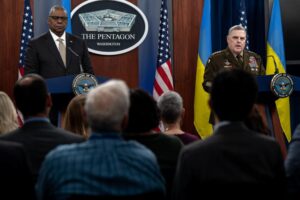Defense Secretary Lloyd Austin on Wednesday detailed new security assistance efforts announced during the latest meeting of the Ukraine Defense Contact Group, to include further bolstering Kyiv’s air defense capabilities as its war against Russia’s invasion heads into the winter months.
“All of these initiatives help prepare the Ukrainians to consolidate their gains during the winter and to prepare to seize new initiatives in the spring. You can see this Contact Group’s ongoing unity and commitment in some of the announcements that its members made,” Austin said during a briefing following the meeting. “These contributions will make a real difference and so does the coordination of our security assistance that this contact group makes possible. So we will continue to deepen our work together.”

The Ukraine Defense Contact Group held its seventh meeting on Wednesday, which was hosted virtually from the Pentagon, where the officials from about 50 countries affirmed they’re in this for “as long as it takes,” according to Austin.
The White House this week has also requested Congress provide $37.7 billion in new supplemental funding to continue supporting Ukraine’s fight against Russia’s ongoing invasion, to include $21.7 billion for additional Pentagon-specific assistance efforts (Defense Daily, Nov. 15).
Austin noted Sweden announced plans today for a $287 million security assistance package to include an air defense system he said “will bolster Ukraine’s ability to defend itself against Russia’s ongoing ruthless attacks.”
During the meeting, Austin added, Spain said it would be sending two more HAWK air defense systems to Ukraine, Germany would be advancing donations of “much needed air defense, artillery and MLRS ammunition” and Poland committed to providing additional artillery, tank ammunition and short-range air defense capabilities
After the Pentagon confirmed last week that the first two National Advanced Surface-to-Air Missile Systems (NASAMS), jointly developed by Raytheon Technologies [RTX] and Norway’s Kongsberg, have been delivered from the U.S. to Ukraine and are now operational, Austin said the systems have had a “100 percent success rate in intercepting Russian missiles.”
Army Gen. Mark Mark Milley, chairman of the Joint Chiefs of Staff, joined Austin at the briefing and cited air defense capabilities as critical for Ukraine’s future success, noting yesterday was “likely the largest wave of missiles that we’ve seen since the beginning of the war” with Russia launching a range of 60 to 100 weapons.
“These missiles, again, they targeted intentionally and damaged civilian power generation facilities to cause unnecessary suffering with the civilian population,” Milley said. “An integrated air defense system, an integrated air and missile defense system, is what is necessary as Ukraine repels Russian aerial attacks. And a significant portion of today’s conversations in today’s meeting with almost 50 countries focused on how we, as a global coalition, can provide the right mix of air defense systems and ammunition for Ukraine to continue its control of the skies and prevent the Russians from achieving air superiority.”
Austin said Greece also announced it would provide 155mm ammunition and Canada detailed plans for a $500 million security assistance package and is leading donations of winter gear for Ukraine.
“I think a winter fight favors the Ukrainians. We’ve pushed enormous amounts of winter gear into Ukraine, thanks to countries like Canada and others who have really been very, very generous. Russia, on the other hand, they’re fighting in a foreign country. The Ukrainians have challenged their supply lines. It will be difficult for them to get the kinds of gear into their troops that they need to be able to fight effectively. And so I think the Ukrainians will have the upper hand…going into the winter,” Austin said.
Milley added that “as best as we can tell” Russia plans to continue fighting into the winter, while he addressed how the conflict could potentially play out both militarily and politically in the near-term.
“The probability of a Ukrainian military victory, defined as kicking the Russians out of all of Ukraine to include what they define or what they claim as Crimea, the probability of that happening anytime soon is not high, militarily. Politically, there may be a political solution where politically Russians withdraw. That’s possible. You want to negotiate from a position of strength. Russia right now is on its back. The Russian military is suffering tremendously,” Milley said.
Austin also addressed the investigation into missiles that struck a town in Poland near the border with Ukraine on Tuesday, following comments from Polish and NATO leadership on Wednesday that the incident was likely caused by an air defense capability from the Ukrainian side while defending against a Russian attack.
“I spoke last night to my Polish counterpart, Deputy Prime Minister and Minister of National Defense [Mariusz] Błaszczak, and I conveyed my deep condolences to the Polish people and to the loved ones of those who were killed. I also underscored America’s ironclad commitment to defend Poland. We have full confidence in the Polish government’s investigation of this explosion and they’ve been conducting that investigation in a professional and deliberate manner. And so, we won’t get ahead of their work,” Austin said. “We’re still gathering information but we have seen nothing that contradicts [Polish] President [Andrzej] Duda’s preliminary assessment that this explosion was most likely the result of a Ukrainian air defense missile that unfortunately landed in Poland. And whatever the final conclusions may be, the world knows that Russia bears the ultimate responsibility for this incident.”